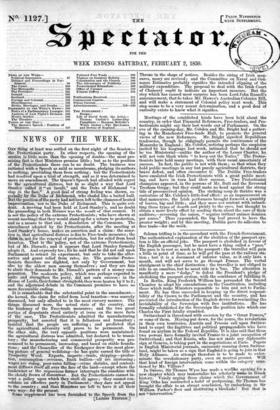Solemn trifling is in the ascendant with the French Government.
The authenticated explanation of the abolition of the passport sys- tem is like an official joke. The passport is abolished in favour of the F.nglish passenger, but he must have a thing called a "pass." The pass is to cost as much as the - rt : the traveller will gain a little in point of time, as he will get the pass at the railway sta- tion ; but it is a document of inferior value, s it only lasts a month, and will not serve to go through Fiance. The verbal abridgment is the chief distinction : the traveller is not obliged to ride in an omnibus, but he must ride in a 'bus. The alteration is manifestly a mere " dodge " to defeat the President's pledge of abolishing the passport system, with the semblance of fulfilling it In Berlin, Xing Frederick William has persuaded the Second Chamber to adopt his emendations on the Constitution, including those which make Ministers reponsible to him and not to Parlia- ment. He has thus succeeded in keeping up the direct responsi- bility of the Crown to the Parliament and the county, and has prevented the introduction of the English device for reconciling the inviolability of the Sovereign with free institutions. He has formally established for the Sovereign the position into which our Charles the First fatally stumbled. Switzerland is threatened with coercion by the "Great Powers," or some of them. Having put down, for the nonce, the revolutions in their own territories, Austria and Prussia call upon Switzer- land to expel the fugitives and political propagandists who have found an asylum in the Federal Republic. It is also said. that those two powers have formally invited France to a joint occupation of Switzerland ; and that Russia, who has not made any diplomatic sign at Geneva, is taking part in the negotiations at Paris. Papers in English Ministerial journals, ominously running down Switzer- land, might be taken as a sign that England is going to join in that Holy Alliance. An attempt therefore is to be made to exter- minate the revolutionary party, even on neutral ground. Will that kind of foreign intervention come within the -category sanc- tioned by Mr. Villiers ? In Greece, Sir Thomas Wyse has made a warhire openinn.° for a new chapter which may immortalize his scholarly name in Greek history. Vainly urging those claims which the Government of King Otho has contracted a habit of postponing, Sir Thomas has brought the affair to an abrupt conclusion, by embarking in Sir William Parker's fleet and instituting a blockade ! But that is not "intervention."


























